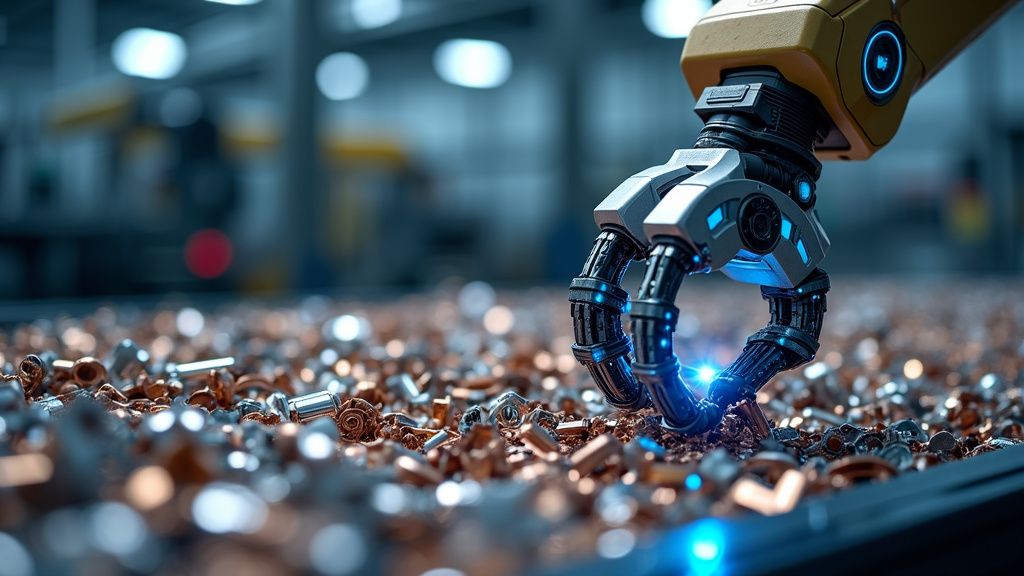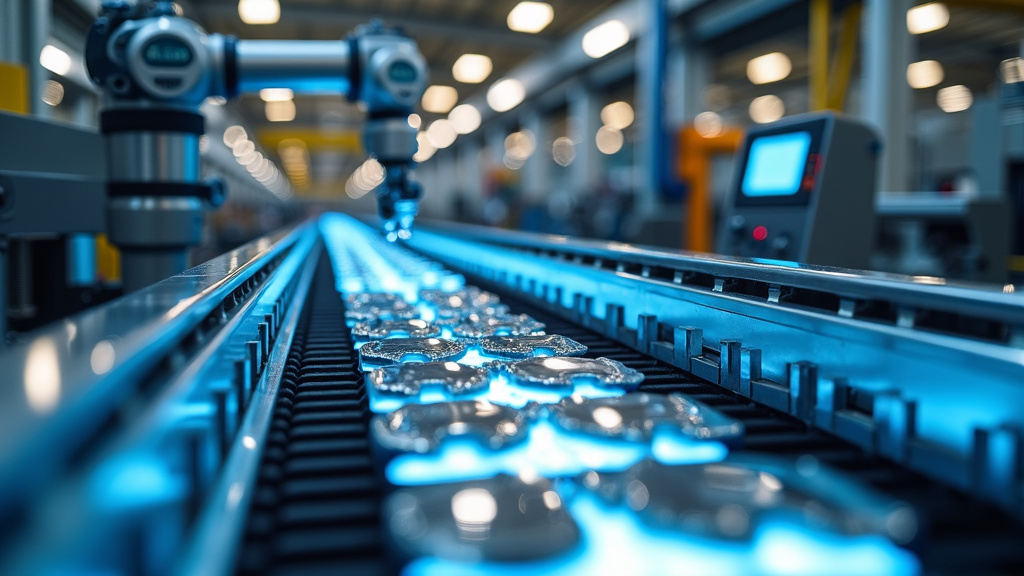5901 Botham Jean Blvd, Dallas, TX 75215
Specialty Metal Eco-Initiatives: Leading the Charge in Sustainability
February 19, 2025Recycling one ton of steel conserves 2,500 pounds of iron ore, 1,400 pounds of coal, and 120 pounds of limestone—underscoring the vital role of specialty metal eco-initiatives in sustainability. Companies like Okon Recycling are at the forefront of this movement, optimizing metal recovery processes to reduce waste and environmental impact.
As industries face increasing pressure to minimize their carbon footprint and preserve natural resources, innovative metal recycling solutions are becoming more critical than ever. Specialty metal eco-initiatives go beyond basic recycling; they integrate cutting-edge technologies and sustainable practices to extend the lifecycle of metal products, reducing reliance on traditional extraction methods.
With global metal demand on the rise, traditional production processes are putting immense strain on natural resources. Okon Recycling and other forward-thinking companies are leading the way in eco-friendly innovations, transforming metal recovery and manufacturing to meet sustainability goals.
From advanced sorting techniques to circular economy strategies, the evolution of specialty metal recycling is reshaping industries. This shift isn’t just about waste reduction—it’s about rethinking how metals are sourced, processed, and reused to create a more resource-efficient future.
Join us as we explore the groundbreaking initiatives driving sustainability in the metal industry and how Okon Recycling is helping pave the way for greener, more responsible industrial practices.
Innovative Techniques in Specialty Metal Recycling

The metal recycling industry is experiencing a significant transformation with cutting-edge technologies enhancing material recovery and promoting sustainability. Advanced recycling techniques are leading to more efficient processes, considerable energy savings, and reduced emissions. As global sustainability goals gain importance, companies are adopting these methods to align with environmental objectives.
AI-Driven Sorting: A Game-Changer
Artificial intelligence has become a powerful tool in metal recycling, transforming the sorting process. AI-powered systems can quickly and accurately identify different types of metals, even when mixed or contaminated. This technology is especially valuable for sorting complex scrap streams that were previously difficult to separate efficiently.
ZenRobotics, for example, has developed an AI-driven robotic system called the Heavy Picker. This solution efficiently sorts and separates various metals in recycling facilities. With advanced sensors, machine learning algorithms, and computer vision, the Heavy Picker can rapidly identify and classify metals with remarkable accuracy.
By automating sorting, AI-driven systems like the Heavy Picker reduce labor costs, increase safety, and significantly enhance the accuracy and efficiency of metal sorting. This technology is proving valuable for the steel industry and other metal recycling sectors, enabling higher recycling rates and improved resource utilization.
Energy-Efficient Processes: Reducing Environmental Impact
Energy efficiency is a crucial focus in advanced metal recycling techniques. Innovative processes are being developed to minimize energy consumption while maximizing material recovery. These methods reduce operational costs and significantly lower greenhouse gas emissions.
The HYBRIT project, a collaboration between Swedish steelmaker SSAB, LKAB, and Vattenfall, is a prime example. This initiative aims to produce fossil-free steel using hydrogen instead of coal. The project incorporates AI-optimized carbon capture processes, maximizing efficiency and minimizing emissions in steel production.
By leveraging these techniques, SSAB estimates its recycling operations prevent the release of about 6 million metric tons of CO2 annually. This reduction in emissions highlights the potential of innovative recycling methods to contribute to global sustainability goals.
Real-World Impact: Success Stories
The adoption of advanced recycling techniques is a growing trend across the industry. Alcoa plans to supply cable company Nexans with low-carbon aluminum rods produced using ELYSIS technology, which eliminates all direct greenhouse gas emissions from smelting and produces oxygen as a byproduct.
Similarly, Sumitomo Metal Mining is establishing recycling facilities at its Toyo smelter and refinery and the Niihama nickel refinery in Japan. These facilities aim to recover valuable metals like copper, nickel, cobalt, and lithium from used batteries and other materials, addressing the challenge of electronic waste.
These success stories show how innovative recycling techniques are practical solutions being implemented by industry leaders. By embracing these methods, companies are achieving improvements in energy efficiency, emission reduction, and sustainability.
The Future of Specialty Metal Recycling
As technology advances, more innovative techniques are expected in specialty metal recycling. From refinements in AI and machine learning algorithms to new energy-efficient processes, the industry is poised for continued growth and improvement.
The adoption of these techniques is crucial for meeting global sustainability goals. By reducing energy consumption, minimizing waste, and lowering greenhouse gas emissions, the metal recycling industry plays a vital role in transitioning to a more sustainable and circular economy.
Looking to the future, it’s clear that innovative techniques in specialty metal recycling will continue to drive positive change. By embracing these advancements, we can work towards a more sustainable future where valuable resources are conserved, emissions are reduced, and the environmental impact of metal production is minimized.
Challenges and Solutions in Specialty Metal Sustainability

The specialty metals industry faces significant hurdles in its quest for sustainability, with contamination and the need for technological innovation in recycling emerging as key challenges. Addressing these issues is imperative for the industry’s advancement and long-term viability.
The Contamination Conundrum
Contamination threatens the recycling and reuse of specialty metals. Even trace amounts of foreign materials can compromise the integrity and performance of these high-value alloys, rendering them unusable for precision applications. This issue is particularly acute in industries like aerospace and medical technology, where material purity is paramount.
The challenge lies not just in preventing contamination but also in developing more sophisticated methods to detect and remove impurities. Traditional recycling methods often fall short when dealing with complex alloy compositions, leading to downcycling or waste.
Innovative solutions are emerging to tackle this problem. Advanced spectrometry and X-ray fluorescence (XRF) analyzers are revolutionizing the way we identify and sort alloys, enabling more precise material recovery. These technologies allow for rapid, non-destructive analysis of metal composition, greatly reducing the risk of contamination in recycled materials.
Technological Innovation: The Key to Unlocking Sustainability
The need for technological innovation in specialty metal recycling cannot be overstated. As demand for these materials grows, particularly in emerging technologies like electric vehicles and renewable energy systems, the pressure to develop more efficient recycling processes intensifies.
One promising area of innovation is automated sorting systems. These cutting-edge technologies leverage artificial intelligence and machine learning to identify and separate different metal types with unprecedented accuracy. By reducing human error and increasing processing speed, these systems improve recycling rates and enhance the quality of recovered materials.
Another exciting development is the application of hydrometallurgical processes for metal recovery. Unlike traditional pyrometallurgical methods, which are energy-intensive and can lead to material loss, hydrometallurgy uses aqueous chemistry to selectively extract and purify metals. This approach reduces energy consumption and allows for the recovery of metals from low-grade sources that were previously uneconomical to process.
Sustainable Mining: A Complementary Approach
While recycling is crucial, sustainable mining practices also play a vital role in ensuring the long-term sustainability of specialty metals. The industry increasingly adopts technologies and methods that minimize environmental impact while maximizing resource efficiency.
For instance, remote sensing technologies, including drones and satellite imagery, are now used to monitor mining sites in real-time. This allows for better resource management, early detection of environmental impacts, and improved compliance with regulations.
Moreover, the concept of ‘urban mining’—recovering metals from electronic waste and other discarded products—is gaining traction. This approach reduces the need for new mineral extraction and addresses the growing issue of e-waste management.
The Road Ahead: Collaboration and Innovation
Addressing challenges in specialty metal sustainability requires a concerted effort from all industry stakeholders. Collaboration between mining companies, recyclers, technology providers, and end-users is essential to drive innovation and implement sustainable practices across the entire value chain.
Investment in research and development is critical. As we push the boundaries of material science and recycling technologies, we open new possibilities for resource efficiency and sustainability. The industry must also work closely with policymakers to create regulatory frameworks that incentivize sustainable practices and foster innovation.
The path to sustainability in specialty metals is not without challenges, but it’s also ripe with opportunities. By embracing technological innovation, improving recycling processes, and adopting sustainable mining practices, the industry can secure its future while contributing to a more circular and sustainable global economy.
| Technology | Company | Application |
|---|---|---|
| AI-Driven Sorting | ZenRobotics | Automated sorting of mixed metals using AI |
| X-ray Fluorescence (XRF) | Redwave | Determines elemental composition for metal sorting |
| X-ray Technology | TOMRA | Reduces cost of purchasing aluminum scrap |
| Handheld LIBS Devices | Thermo Scientific | Analyzes light metals on-site |
| Blockchain | Various | Improves traceability and authentication in recycling |
The Role of Specialty Metal Eco-Initiatives in a Circular Economy

Specialty metal initiatives play a crucial role in advancing the circular economy, transforming our approach to resource management and sustainability. By focusing on innovative recycling methods and material reuse, these initiatives reshape industries and significantly contribute to reducing environmental impact.
Central to these efforts is the concept of a circular economy, which aims to eliminate waste and maximize resource efficiency. Unlike the traditional linear ‘take-make-dispose’ model, a circular approach keeps materials in use for as long as possible, extracting maximum value before recovering and regenerating products at the end of their service life.
Innovative Recycling Technologies
Specialty metal initiatives contribute to the circular economy through advanced recycling technologies. For example, new methods for recycling electronic waste are being developed to recover precious and specialty metals from discarded devices.
These innovative processes not only reduce the need for raw material extraction but also help mitigate the environmental impact associated with e-waste disposal. By reclaiming metals like gold, silver, and rare earth elements from electronic devices, we can significantly reduce the demand for virgin resources.
Furthermore, cutting-edge sorting technologies, such as artificial intelligence and robotics, enhance the efficiency and accuracy of metal recycling processes. These advancements allow for better separation of different metal types, resulting in higher-quality recycled materials that can be used in a wider range of applications.
Material Reuse and Resource Efficiency
Specialty metal initiatives also focus on designing products for easier disassembly and recyclability. This approach, known as ‘design for recycling,’ ensures that metals can be more efficiently recovered and reused at the end of a product’s life cycle.
For example, the automotive industry has made significant strides in implementing circular economy principles through steel recycling. Many car manufacturers now design vehicles with recyclability in mind and use a high percentage of recycled steel in their production processes, reducing both waste and the need for virgin materials.
These efforts contribute to resource efficiency by keeping valuable metals in circulation for longer periods. This not only conserves natural resources but also reduces the energy consumption and greenhouse gas emissions associated with primary metal production.
Environmental Impact Reduction
The environmental benefits of specialty metal eco-initiatives are substantial. By reducing the need for mining and processing raw ores, these initiatives help preserve natural habitats and biodiversity. Additionally, recycling metals typically requires less energy than extracting and processing virgin materials, leading to significant reductions in carbon emissions.
For instance, recycling aluminum requires only about 5% of the energy needed to produce primary aluminum, resulting in a 95% reduction in greenhouse gas emissions. This dramatic energy saving illustrates the profound impact that metal recycling can have on our environment.
Sustainable Development and Economic Growth
Specialty metal eco-initiatives not only benefit the environment but also contribute to sustainable economic development. The circular economy model creates new business opportunities and jobs in recycling, remanufacturing, and innovative product design.
Moreover, by reducing dependence on raw material imports and stabilizing supply chains, these initiatives can enhance economic resilience and foster local industries. This aligns perfectly with the goals of sustainable development, balancing economic growth with environmental protection and social inclusion.
As we continue to face global challenges like resource scarcity and climate change, the role of specialty metal eco-initiatives in promoting a circular economy becomes increasingly vital. By embracing these innovative approaches, we can work towards a more sustainable and resource-efficient future for generations to come.
| Metal | Energy Savings (%) | Emission Reductions (Metric Tons CO2) |
|---|---|---|
| Aluminum | 95% | 500 million annually |
| Steel | 60% | Significant reduction |
| Copper | 85% | Not specified |
Conclusion: Charting a Sustainable Future with Specialty Metals
Specialty metal eco-initiatives are transforming industries, proving that sustainability and profitability can coexist. Companies like Okon Recycling lead the way, offering practical, efficient recycling solutions that reduce waste while maximizing resource recovery.
The future of sustainable metal management isn’t just about recycling—it’s about rethinking how we use materials and supporting a circular economy. Businesses and consumers alike can drive change by choosing recycled materials, advocating for eco-friendly practices, and partnering with industry leaders.
Ready to make an impact? Contact Okon Recycling today at 214-717-4083 and discover how their expertise can help your business reduce waste, save costs, and contribute to a greener future. Let’s build a more sustainable tomorrow—together.
